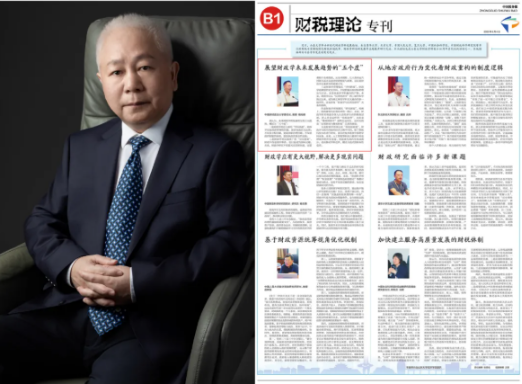
[Media Platform] China Taxation News, June 4, 2025 (Version B1).
[Main Views] Professor Yang Canming identifies five major trends shaping the future development of Public Finance, summarized as the "Five Dimensions":
I. Elevating Disciplinary Standing: Public Finance is a discipline that transcends traditional economic management and intersects with political science and law. It will evolve from a technical field of resource allocation into a core component of state governance, reflecting not only government functions but also the will of the ruling party.
II. Broadening the Global Scope of the Discipline: Public Finance is no longer confined to domestic issues; it is increasingly becoming an international agenda. In the future, research on Public Finance must move beyond national finance to explore global finance, and the fiscal systems and policies must be designed from a global perspective and based on the community with a shared future for mankind. This should be an important direction for future research on Public Finance.
III. Expanding Interdisciplinary Integration: As a typical interdisciplinary subject, Public Finance not only incorporates theories and methods from various disciplines but is also the product of the integration of multiple disciplines. In the future, Public Finance should separate from the second-level discipline Applied Economics and become a new first‑level discipline that truly reflects interdisciplinary integration. This involves a reconstruction of the relationship between Public Finance and Applied Economics.
IV. Deepening Research Focus: Traditionally, finance has been viewed as part of macroeconomics. In the future, research on Public Finance will gradually go deeper into the micro level of social and economic life—what Professor Yang calls the "capillaries" of social systems. This shift may give rise to a new subfield of Micro Public Finance, reflecting a rebalanced relationship between Macro Public Finance and Micro Public Finance.
V. Embracing Technological Innovation: The integration of Public Finance with modern technology is unstoppable. Technological methods are not only useful tools for research, but also help reshape the discipline itself in technological scenarios. In the future, artificial intelligence and other tech tools will no longer be external aids for Public Finance, but will become intrinsic components of the discipline itself, driving fundamental changes in its boundaries, models, and paradigms.
[About the Author] Yang Canming, Professor and PhD in Economics, holds honorary doctorates from the Sapienza University of Rome in Italy and Dongseo University in South Korea. He is the former President and Deputy Secretary of the CPC Committee of Zhongnan University of Economics and Law (ZUEL). He currently serves as Director of the Center for International Cooperation and Disciplinary Innovation of Income Distribution and Public Finance (111 Center) under the Ministry of Education and Ministry of Human Resources and Social Security of the People's Republic of China, and is a doctoral supervisor, a second-level professor, and a senior professor at the School of Public Finance and Taxation, ZUEL. Additionally, he is Vice President of the Society of Public Finance of China, Vice Chairman of China Teaching Guidance Committee for Public Finance Majors of the Ministry of Education, a discipline expert on Expert Committee on Higher Education Philosophy and Social Sciences (Marxist Theoretical Research and Construction Projects) of the National Textbook Committee, one of the talents in National Talent Project, "Famous Cultural Talent" awarded by the Publicity Department of the CPC Central Committee, the talent of the "Four Batches" Talent Project, Member of the 8th Applied Economics Discipline Review Group of the State Council, one of the first talents in "New Century National Hundred, Thousand and Ten Thousand Talent Project", an expert of the "Program for New Century Excellent Talents in University" of the Ministry of Education, expert of the training program of the "Cross-century Qualified Disciplinary Leaders" by the Ministry of Finance, and expert with special allowances from the State Council. His research mainly focuses on basic fiscal theories and fiscal policies. He has led more than 20 national, provincial and ministerial level projects, including the Major Program of NSSFC, Major Program of Philosophy and Social Sciences Research of the Ministry of Education, "Four Batches" Talent Project of the Publicity Department of the CPC Central Committee, Entrusted Program of the General Office of the CPC Central Committee, Program of NSSFC, Program of Fok Ying Tung Education Foundation of Ministry of Education, such as "Research for Promoting the Common Prosperity of All People", "Research on Regulating the Order of Income Distribution", "Research of Local Financial Behavior and Its Regularization", and "Research of the Chinese Government Procurement". The Public Finance of China compiled under his leadership was selected as one of the first Chinese economics textbooks. A number of his research reports have received important instructions from leaders at the provincial and ministerial levels or have been adopted by government departments. Professor Yang has published more than 10 monographs and translations, including the Research on Regulating the Order of Income Distribution, Market Structure and Government Economic Behavior, and Fiscal Theory and Institutional Innovation. He has released over 160 academic papers in various important journals, including Social Sciences in China, Economic Research Journal, Journal of Management World, Finance & Trade Economics, Public Finance Research, and Economic Perspectives. More than 30 of his research results have been reproduced in Xinhua Digest and Chinese Social Science Digest, and reposted on the China Social Science Excellence platform. With his achievements, he has won over 20 important awards, including national awards (the first prize of Outstanding Scientific Research Achievements Award of Higher Education Institutions of China and the second prize of the National Teaching Achievement Award for Higher Education), provincial awards (the first prize of Excellent Achievements in Social Sciences of Hubei Province, the first prize of Development Research Award of Hubei Province, and the first prize of Outstanding Research Achievements of the CPC Hubei Provincial Committee), the first prize of the Excellent Teaching Materials of the Ministry of Finance, the Soft Science Professional Research Award of China, and the ACCA Outstanding Achievement Award. He was named the favorite president of university students.
